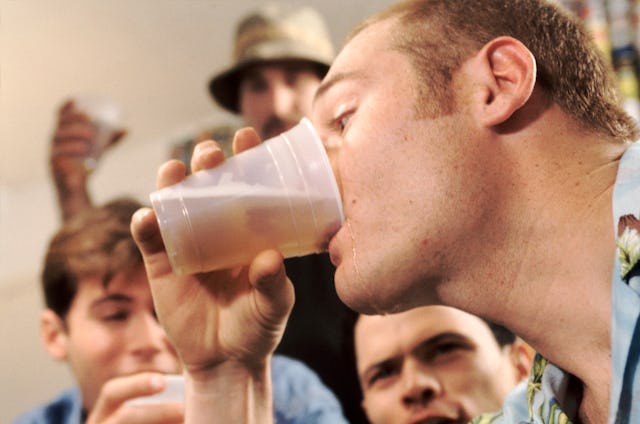Teens Who Drink With Parental Supervision More Likely To Drink More As Young Adults
Apparently, “I’d rather you drink in the house” isn’t a great harm reduction strategy.

When it comes to teenage drinking, there’s an argument out there perhaps most famously summed up by Regina George’s (cool) mom in Mean Girls. “If you're gonna drink, I'd rather you drink here.” Many a well-meaning parent has thought “Well, if they’re going to drink, I’d rather they do it someplace safe, where I can supervise them or intervene, rather than have them sneak off and drink and get into trouble.” But a new study published in the journal Addictive Behaviors has found that, actually, children and teenagers who have alcohol with their parents’ permission — even a sip or a taste — are more likely to engage in risky drinking in young adulthood.
The study, led by Bernard “Berny” Pereda at the University at Buffalo, looked at questionnaires from nearly 400 children — starting at age 11 — from 2009 to 2018 and their parents to see whether more permissive drinking rules in adolescence (even something like “OK, you can have one sip of my pinot noir...”) predicted alcohol use as a young adult. Participants were asked about child and parent alcohol use, attitudes about drinking, and rules about drinking in the home.
Analysis of the data found that about 80% of respondents say they’d had alcohol with their parents permission, from anywhere between the ages of 5 and 17, but usually in the neighborhood of 12 years old. Furthermore, the data show that those adolescents were more to drink often and heavier in young adulthood than those whose parents did not permit any alcohol consumption. Problematic drinking, including alcohol use disorder, was also more prevalent in this cohort.
While other studies have debunked the (again, usually well-meaning) idea that exposing underaged kids to a little alcohol with demystify the allure of drinking and keep them safe, this is the first study to examine whether the age of exposure makes a difference.
It found that it does not. Whether a child is 5 or 17, it’s the early exposure, not the precise age, that corresponds to poorer outcomes in regard to alcohol consumption in early adulthood.
There are some mitigating factors, the study acknowledges. Researchers aren’t sure if there’s a difference between, say, the 9 year old who got to have a sip of champagne one New Year’s Eve or the 15 year old who gets a quarter cup of wine at Sunday dinners. They’re also not sure how a child’s personality or family context may play a role in predicting outcomes. But ultimately, the researchers were clear in their overall conclusions.
“Irrespective of the age of onset, parental permission to drink alcohol confers risk to adolescents for later alcohol use and related harms,” Pereda wrote. “Our findings highlight the need for targeted public health messages that emphasize this risk to parents in an effort to change parental perceptions about drinking with parental permission.”